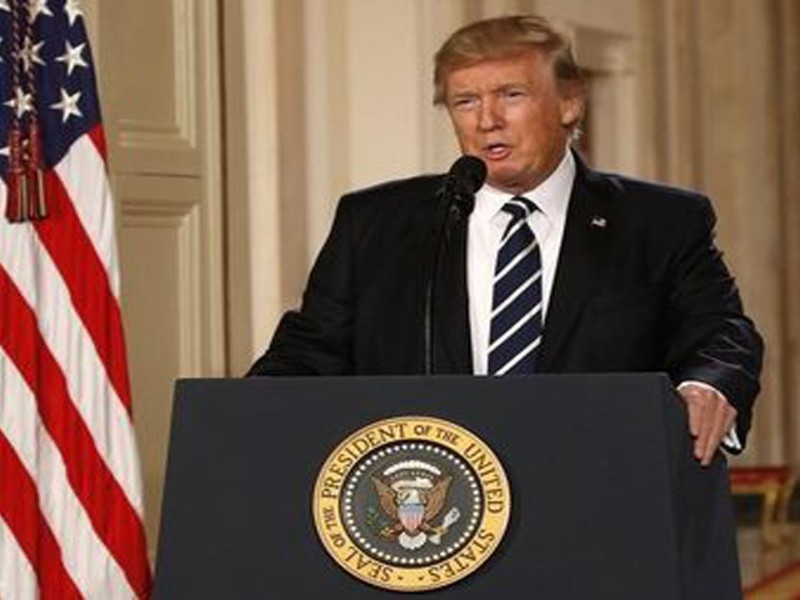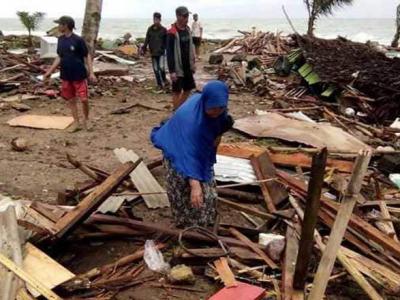(COLOMBO, LANKAPUVATH) –Less than a day after Iran fired more than a dozen ballistic missiles at bases in Iraq housing U.S. and coalition forces, President Donald Trump on Wednesday appeared to decide against further escalating a military confrontation with Iran.
“As we continue to evaluate options in response to Iranian aggression, the United States will immediately impose additional punishing economic sanctions on the Iranian regime,” Trump said in an address to the nation.
Sanctions, however, punishing, would represent a marked de-escalation of the current tensions between the United States and Iran, which began last week when an American drone killed top Iranian General Qasem Soleimani.
In response to the extrajudicial killing of Soleimani, Iran on Tuesday fired missiles at several Iraqi military bases known to house U.S. and coalition forces involved in the fight against ISIS.
But instead of announcing a stepped up military offensive, however, Trump used his prepared remarks on Wednesday to strike an uncharacteristically positive note.
“I’m pleased to inform you, the American people should be extremely grateful and happy,” Trump said. “No Americans were harmed in last night’s attack by the Iranian regime. We suffered no casualties. All of our soldiers are safe and only minimal damage was sustained at our military bases. Our great American forces are prepared for anything.”
“Iran appears to be standing down, which is a good thing for all parties concerned and a very good thing for the world,” Trump continued. “No American or Iraqi lives were lost because of the precautions taken, the dispersal of forces and an early warning system that worked very well.”
Trump defended the controversial U.S. decision to kill Soleimani while the general was visiting Iraq last week, calling him a “terrorist.” But the president stopped far short of threatening further military action.
“As we continue to evaluate options in response to Iranian aggression, the United States will immediately impose additional punishing economic sanctions on the Iranian regime,” Trump said. “These powerful sanctions will remain until Iran changes its behavior.”
Ever increasing sanctions have become a hallmark of the Trump administration’s approach to Iran, part of what the White House calls a “maximum pressure campaign” against the Islamic Republic.
The sanctions have succeeded in punishing Iran for a series of destabilizing activities throughout the Middle East. But beyond punishment, it has not always been clear exactly what the United States hopes to achieve by imposing ever tighter sanctions.
Last month, State Department officials said that the maximum pressure campaign on Iran will intensify in 2020, as the U.S. seeks to rein in Tehran’s pursuit of nuclear infrastructure and regional aggression.”
“There will be more sanctions to come, and Iran’s economic problems and challenges are going to compound in 2020,” a senior State Department official said on a Dec. 30 call with reporters. “They are already deep into a recession, and we are also seeing Iran come under greater diplomatic isolation.”
Another senior State Department official added that the Trump administration has sanctioned approximately 1,000 individuals and entities with links to Iran’s malign activities.
“What we are doing is denying the regime the revenue that it needs to run an expansionist foreign policy, and by that policy, Iran has less money to spend today than it did almost three years ago when we came into office,” the official, who spoke on the condition of anonymity, said.
In December, Secretary of State Mike Pompeo announced another round of fresh sanctions on Tehran, this time targeting Iran’s largest shipping company and biggest airline, saying the companies are aiding the Iranian regime’s alleged proliferation of weapons of mass destruction.
“As long as its malign behaviors continue, so will our campaign of maximum pressure,” Pompeo said during a Dec. 11 press conference at the State Department.




